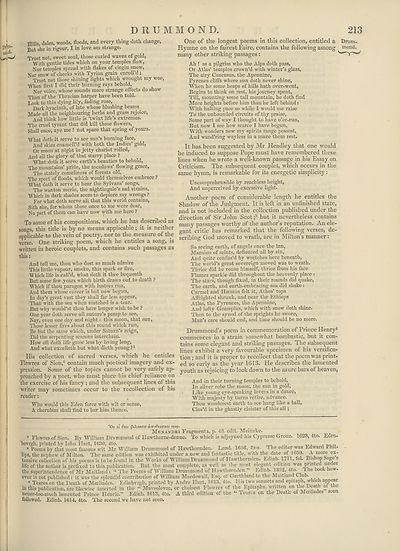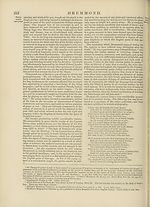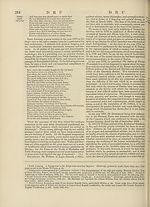Encyclopaedia Britannica > Volume 8, DIA-England
(223) Page 213
Download files
Complete book:
Individual page:
Thumbnail gallery: Grid view | List view

DRUMMOND.
213
Hills, dales, woods, floods, and every thing doth change,
But she in rigour, I in love am strange.
Trust not, sweet soul, those curled waves of gold,
With gentle tides which on your temples flow,
Nor temples spread with flakes of virgin snow,
Nor snow of cheeks with Tyrian grain enroll’d;
* Trust not those shining lights which wrought my woe,
When first I did their burning rays behold.
Nor voice, whose sounds more strange effects do show
Than of the Thracian harper have been told.
Look to this dying lily, fading rose,
Dark hyacinth, of late whose blushing beams
Made all the neighbouring herbs and grass rejoice,
And think how little is ’twixt life’s extremes.
The cruel tyrant that did kill those flowers,
Shall once, aye me ! not spare that spring of yours.
What doth it serve to see sun’s burning face,
And skies enamell’d with both the Indies’ gold,
Or moon at night in .jetty chariot rolled,
And all the glory of that starry place ?
What doth it serve earth’s beauties to behold,
The mountains’ pride, the meadows’ flowing grace.
The stately comeliness of forests old,
The sport of floods, which would themselves embrace ?
What doth it serve to hear the Sylvans’ songs, _
The wanton merle, the nightingale’s sad strains.
Which in dark shades seem to deplore my wrongs ?
For what doth serve all that this world contains,
Sith she, for whom those once to me were dear,
No part of them can have now with me here ?
To some of his compositions, which he has described as
songs, this title is by no means applicable; it is neither
applicable to the vein of poetry, nor to the measure of the
verse. One striking poem, which he entitles a song, is
written in heroic couplets, and contains such passages as
this:
And tell me, thou who dost so much admire
This little vapour, smoke, this spark or fire,
Which life is call’d, what doth it thee bequeath
But some few years which birth draws out to death ?
Which if thou paragon with lustres run,
And them whose career is but now begun,
In day’s great vast they shall far less appear,
Than with the sea when matched is a tear.
But why would’st thou here longer wish to be ?
One year doth serve all nature’s pomp to see,
Nay, even one day and night: this moon, that sun,
Those lesser fires about this round which run,
Be but the same which, under Saturn’s reign,
Did the serpenting seasons interchain.
How oft doth life grow less by living long,
And what excellet'h but what dieth young?1
His collection of sacred verses, which he entitles
Flowres of Sion,2 contain much poetical imagery and ex¬
pression. Some of the topics cannot be very safely ap¬
proached by a poet, who must place his chief reliance on
the exercise of his fancy; and the subsequent lines of this
writer may sometimes occur to the recollection of his
reader:
Who would this F.den force with wit or sense,
A cherubim shall find to bar him thence.
One of the longest poems in this collection, entitled a
Hymne on the fairest Faire, contains the following among
many other striking passages :
Ah ! as a pilgrim who the Alps doth pass,
Or Atlas’ temples crowm’d with winter’s glass,
The airy Caucasus, the Apennine,
Pyrenes cliffs where sun doth never shine,
When he some heaps of hills hath over-went,
Begins to think on rest, his journey spent,
Till, mounting some tall mountain, he doth find
More heights before him than he left behind:
With halting pace so while I would me raise
To the unbounded circuits of thy praise,
Some part of way I thought to have o’er-run,
But now I see how scarce I have begun,
With wonders new my spirits range possest,
And wand’ring way less in a maze them rest.
It has been suggested by Mr Headley that one would
be induced to suppose Pope must have remembered these
lines when he wrote a well-known passage in his Essay on
Criticism. The subsequent couplet, which occurs in the
same hymn, is remarkable for its energetic simplicity:
, Uncomprehensible by reachless height,
And unperceived by excessive light.
Another poem of considerable length he entitles the
Shadow of the Judgment. It is left in an unfinished state,
and is not included in the collection published under the
direction of Sir John Scot ;3 but it nevertheless contains
many passages worthy of the author’s reputation. An ele¬
gant critic has remarked that the following verses, de¬
scribing God moved to wrath, are in Milton’s manner:
So seeing earth, of angels once the inn,
Mansion of saints, defloured all by sin,
And quite confus’d by wretches here beneath,
The world’s great sovereign moved was to wrath.
Thrice did he rouse himself, thrice from his face
Flames sparkle did throughout the heavenly place :
The stars, though fixed, in their rounds did quake,
The earth, and earth-embracing sea did shake :
Carmel and FIsemus felt it, Athos’ tops
Affrighted shrunk, and near the F.thiops
Atlas, the Pyrenees, the Apennine,
And lofty Grampius, -which with snow doth shine.
Then to the synod of the sprights he swore,
Man’s care should end, and time should be no more.
Drummond’s poem in commemoration of Prince Henry4
commences in a strain somewhat bombastic, but it con¬
tains some elegant and striking passages. The subsequent
lines exhibit a very favourable specimen of his versifica¬
tion ; and it is proper to recollect that the poem was print¬
ed so early as the year 1613. He describes the lamented
youth as rejoicing to look down to the azure bars of heaven,
And in their turning temples to behold.
In silver robe the moon, the sun in gold,
Like young eye-speaking lovers in a dance,
With majesty by turns retire, advance.
Thou wonderest earth to see hang like a ball.
Clos’d in the ghastly cloister of this all;
'Ov o\ hoi ipiXouiriv uffollvrirxii vim.
Menandri Fragmenta, p. 48- edit. Meineke.
* Flowres of Sion. By William Drvmmond of Hawthorne-denne. To which is adjoyned his Cypresse Groue. 1623, 4to. Euen-
bovrgh, printed by lohn Hart, 1630, 4to.
3 Poems by that most famous wit Mr William Drummond of Hawthornden. Lond. 1656, 8vo. The editor was Edward Ihu-
lips, the nephew of Milton. The same edition was exhibited under a new and fantastic title, with the date of A,1*101^ e^'
tensive collection of his poems is to be found in the Works of W illiam Drummond of Hawthornden. Edinb. 1711, ml* ,1S °P a^.e K
life of the author is prefixed to this publication. But the most complete, as well as the most elegant edition was printed under
the superintendence of Mr Maitland: “ The Poems of William Drummond of Hawthornden.” Edinb. 1832, 4t°- 4iie booK now-
followed. Edinb. 1614, 4to. The second we have not seen.
213
Hills, dales, woods, floods, and every thing doth change,
But she in rigour, I in love am strange.
Trust not, sweet soul, those curled waves of gold,
With gentle tides which on your temples flow,
Nor temples spread with flakes of virgin snow,
Nor snow of cheeks with Tyrian grain enroll’d;
* Trust not those shining lights which wrought my woe,
When first I did their burning rays behold.
Nor voice, whose sounds more strange effects do show
Than of the Thracian harper have been told.
Look to this dying lily, fading rose,
Dark hyacinth, of late whose blushing beams
Made all the neighbouring herbs and grass rejoice,
And think how little is ’twixt life’s extremes.
The cruel tyrant that did kill those flowers,
Shall once, aye me ! not spare that spring of yours.
What doth it serve to see sun’s burning face,
And skies enamell’d with both the Indies’ gold,
Or moon at night in .jetty chariot rolled,
And all the glory of that starry place ?
What doth it serve earth’s beauties to behold,
The mountains’ pride, the meadows’ flowing grace.
The stately comeliness of forests old,
The sport of floods, which would themselves embrace ?
What doth it serve to hear the Sylvans’ songs, _
The wanton merle, the nightingale’s sad strains.
Which in dark shades seem to deplore my wrongs ?
For what doth serve all that this world contains,
Sith she, for whom those once to me were dear,
No part of them can have now with me here ?
To some of his compositions, which he has described as
songs, this title is by no means applicable; it is neither
applicable to the vein of poetry, nor to the measure of the
verse. One striking poem, which he entitles a song, is
written in heroic couplets, and contains such passages as
this:
And tell me, thou who dost so much admire
This little vapour, smoke, this spark or fire,
Which life is call’d, what doth it thee bequeath
But some few years which birth draws out to death ?
Which if thou paragon with lustres run,
And them whose career is but now begun,
In day’s great vast they shall far less appear,
Than with the sea when matched is a tear.
But why would’st thou here longer wish to be ?
One year doth serve all nature’s pomp to see,
Nay, even one day and night: this moon, that sun,
Those lesser fires about this round which run,
Be but the same which, under Saturn’s reign,
Did the serpenting seasons interchain.
How oft doth life grow less by living long,
And what excellet'h but what dieth young?1
His collection of sacred verses, which he entitles
Flowres of Sion,2 contain much poetical imagery and ex¬
pression. Some of the topics cannot be very safely ap¬
proached by a poet, who must place his chief reliance on
the exercise of his fancy; and the subsequent lines of this
writer may sometimes occur to the recollection of his
reader:
Who would this F.den force with wit or sense,
A cherubim shall find to bar him thence.
One of the longest poems in this collection, entitled a
Hymne on the fairest Faire, contains the following among
many other striking passages :
Ah ! as a pilgrim who the Alps doth pass,
Or Atlas’ temples crowm’d with winter’s glass,
The airy Caucasus, the Apennine,
Pyrenes cliffs where sun doth never shine,
When he some heaps of hills hath over-went,
Begins to think on rest, his journey spent,
Till, mounting some tall mountain, he doth find
More heights before him than he left behind:
With halting pace so while I would me raise
To the unbounded circuits of thy praise,
Some part of way I thought to have o’er-run,
But now I see how scarce I have begun,
With wonders new my spirits range possest,
And wand’ring way less in a maze them rest.
It has been suggested by Mr Headley that one would
be induced to suppose Pope must have remembered these
lines when he wrote a well-known passage in his Essay on
Criticism. The subsequent couplet, which occurs in the
same hymn, is remarkable for its energetic simplicity:
, Uncomprehensible by reachless height,
And unperceived by excessive light.
Another poem of considerable length he entitles the
Shadow of the Judgment. It is left in an unfinished state,
and is not included in the collection published under the
direction of Sir John Scot ;3 but it nevertheless contains
many passages worthy of the author’s reputation. An ele¬
gant critic has remarked that the following verses, de¬
scribing God moved to wrath, are in Milton’s manner:
So seeing earth, of angels once the inn,
Mansion of saints, defloured all by sin,
And quite confus’d by wretches here beneath,
The world’s great sovereign moved was to wrath.
Thrice did he rouse himself, thrice from his face
Flames sparkle did throughout the heavenly place :
The stars, though fixed, in their rounds did quake,
The earth, and earth-embracing sea did shake :
Carmel and FIsemus felt it, Athos’ tops
Affrighted shrunk, and near the F.thiops
Atlas, the Pyrenees, the Apennine,
And lofty Grampius, -which with snow doth shine.
Then to the synod of the sprights he swore,
Man’s care should end, and time should be no more.
Drummond’s poem in commemoration of Prince Henry4
commences in a strain somewhat bombastic, but it con¬
tains some elegant and striking passages. The subsequent
lines exhibit a very favourable specimen of his versifica¬
tion ; and it is proper to recollect that the poem was print¬
ed so early as the year 1613. He describes the lamented
youth as rejoicing to look down to the azure bars of heaven,
And in their turning temples to behold.
In silver robe the moon, the sun in gold,
Like young eye-speaking lovers in a dance,
With majesty by turns retire, advance.
Thou wonderest earth to see hang like a ball.
Clos’d in the ghastly cloister of this all;
'Ov o\ hoi ipiXouiriv uffollvrirxii vim.
Menandri Fragmenta, p. 48- edit. Meineke.
* Flowres of Sion. By William Drvmmond of Hawthorne-denne. To which is adjoyned his Cypresse Groue. 1623, 4to. Euen-
bovrgh, printed by lohn Hart, 1630, 4to.
3 Poems by that most famous wit Mr William Drummond of Hawthornden. Lond. 1656, 8vo. The editor was Edward Ihu-
lips, the nephew of Milton. The same edition was exhibited under a new and fantastic title, with the date of A,1*101^ e^'
tensive collection of his poems is to be found in the Works of W illiam Drummond of Hawthornden. Edinb. 1711, ml* ,1S °P a^.e K
life of the author is prefixed to this publication. But the most complete, as well as the most elegant edition was printed under
the superintendence of Mr Maitland: “ The Poems of William Drummond of Hawthornden.” Edinb. 1832, 4t°- 4iie booK now-
followed. Edinb. 1614, 4to. The second we have not seen.
Set display mode to:
![]() Universal Viewer |
Universal Viewer | ![]() Mirador |
Large image | Transcription
Mirador |
Large image | Transcription
Images and transcriptions on this page, including medium image downloads, may be used under the Creative Commons Attribution 4.0 International Licence unless otherwise stated. ![]()
| Encyclopaedia Britannica > Encyclopaedia Britannica > Volume 8, DIA-England > (223) Page 213 |
|---|
| Permanent URL | https://digital.nls.uk/193325904 |
|---|
| Attribution and copyright: |
|
|---|
| Description | Ten editions of 'Encyclopaedia Britannica', issued from 1768-1903, in 231 volumes. Originally issued in 100 weekly parts (3 volumes) between 1768 and 1771 by publishers: Colin Macfarquhar and Andrew Bell (Edinburgh); editor: William Smellie: engraver: Andrew Bell. Expanded editions in the 19th century featured more volumes and contributions from leading experts in their fields. Managed and published in Edinburgh up to the 9th edition (25 volumes, from 1875-1889); the 10th edition (1902-1903) re-issued the 9th edition, with 11 supplementary volumes. |
|---|---|
| Additional NLS resources: |
|

